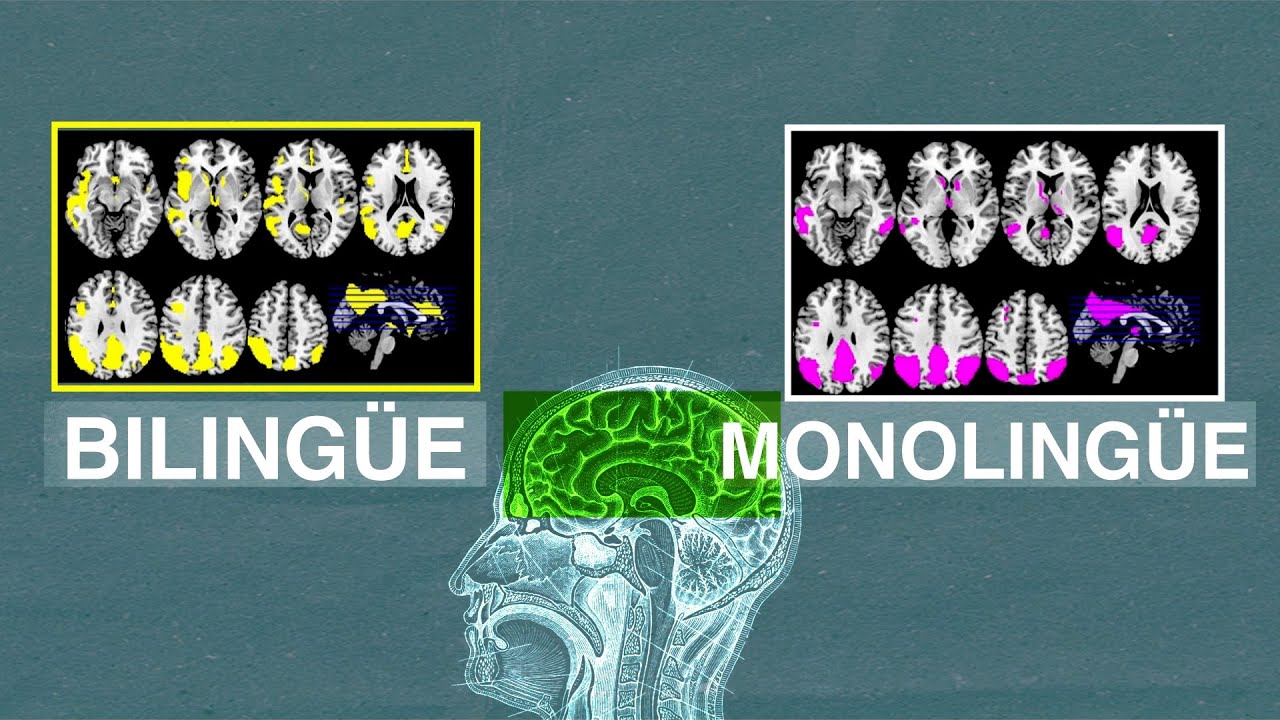Does Being Bilingual Make You Smarter?
Summary
TLDRIn this episode of D News, guest Alice Gile discusses the cognitive benefits of bilingualism. Research from the University of Edinburgh suggests that speaking multiple languages can slow brain aging and delay dementia. A study in 'Annals of Neurology' shows that even learning a second language later in life can boost cognitive abilities and intelligence. While bilinguals may experience slower lexical access, the ability to think through actions before acting is enhanced, potentially leading to better decision-making.
Takeaways
- 🌟 The video features a discussion on the benefits of being bilingual, with Alice Gile as a guest.
- 🧠 Research from the University of Edinburgh suggests that bilingualism can slow down the brain's aging process and delay dementia.
- 🤔 The debate on whether learning a new language makes one smarter or if smarter people are more likely to learn languages has been ongoing.
- 📚 A study in the journal 'Annals of Neurology' focused on older adults to understand the impact of bilingualism on cognitive abilities.
- 📉 The study involved 835 native English speakers from Edinburgh, Scotland, who took intelligence tests at ages 11 and 76.
- 🌐 A third of the participants spoke a language other than English, with most learning it before the age of 18.
- 📈 Bilingual participants showed better cognitive abilities than expected based on their childhood intelligence tests.
- 📚 Even those who learned a second language after age 18 showed improved cognitive performance.
- 💡 Speaking multiple languages is associated with higher general intelligence and better reading comprehension.
- 🗣️ A 2012 study in 'Psychological Science' found that multilingualism reduces cognitive inconsistencies and aids in making rational decisions.
- 🚧 Bilingualism can have downsides, such as delayed lexical access and difficulty in switching between languages, which can affect communication.
- 🤓 Despite potential communication challenges, the cognitive benefits of bilingualism seem to outweigh the drawbacks, encouraging lifelong language learning.
Q & A
What is the main topic discussed in the D news video featuring Alice Gile?
-The main topic discussed is the cognitive benefits of being bilingual, including the potential to slow down brain aging and delay dementia.
What did researchers at the University of Edinburgh find regarding the impact of bilingualism on the brain?
-Researchers found that speaking multiple languages can slow down the brain's aging process and delay the onset of dementia.
What is the classic debate in the field of bilingualism research?
-The classic debate is whether learning a new language makes a person smarter or if smarter people are more likely to learn new languages.
What did the study in the 'Annals of Neurology' focus on to address the classic debate?
-The study focused on older participants, specifically native English speakers from Edinburgh, Scotland, to determine the impact of learning a second language on cognitive abilities.
What was the age range of the participants in the study from the 'Annals of Neurology'?
-The participants were initially tested at age 11 and then retested 65 years later.
What did the study find about the relationship between learning a second language and cognitive abilities?
-The study found that participants who spoke two or more languages had better cognitive abilities than expected based on their childhood intelligence tests.
What was the significance of the finding that even participants who learned a second language after age 18 had better cognitive test results?
-This finding suggests that it is not too late to learn a second language and potentially benefit from improved cognitive abilities.
According to a 2012 study published in 'Psychological Science', what additional benefits does speaking multiple languages offer?
-The study revealed that speaking several languages reduces cognitive inconsistencies and helps individuals make more rational decisions.
What are some of the potential downsides to being bilingual mentioned in the script?
-The potential downsides include slower lexical access when speaking, and difficulty in switching off one language in favor of another, which can lead to awkward moments in conversation.
What did the studies from Penn State and Northwestern University find about bilingual individuals' language processing?
-The studies found that bilingual individuals can experience delayed lexical access and have difficulty switching off one language, which can be a disadvantage for smooth communication but an advantage for thoughtful decision-making.
What does the script suggest about the general public's opinion on learning multiple languages?
-The script invites viewers to share their thoughts on whether learning multiple languages is cool or not, indicating that opinions on the matter may vary.
Outlines

This section is available to paid users only. Please upgrade to access this part.
Upgrade NowMindmap

This section is available to paid users only. Please upgrade to access this part.
Upgrade NowKeywords

This section is available to paid users only. Please upgrade to access this part.
Upgrade NowHighlights

This section is available to paid users only. Please upgrade to access this part.
Upgrade NowTranscripts

This section is available to paid users only. Please upgrade to access this part.
Upgrade NowBrowse More Related Video

Why being bilingual is good for your brain | BBC Ideas

THE BILINGUAL BRAIN - Does speaking two or more languages make you smarter? | BENEFITS

The benefits of a bilingual brain - Mia Nacamulli

A neuroscientist explains how being bilingual makes your brain more robust

Is being bilingual good for you brain? | BBC Ideas

Qué pasa en el cerebro si hablas varios idiomas
5.0 / 5 (0 votes)